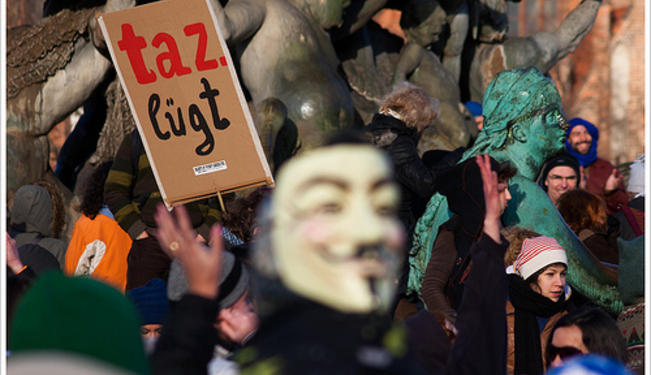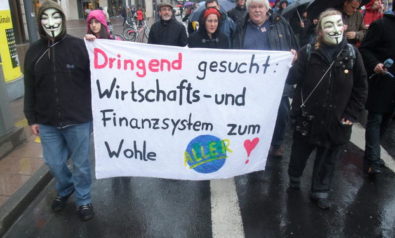Why Occupy Germany has not become an important political factor. “Is capitalism eating its children?” asked a newspaper. “Wall street first, now all over the world” read another headline. When Occupy Hamburg activists stormed Josef Ackermann, CEO of Deutsche Bank AG’s speech in November last year to protest against the largest German bank’s economic power, and when activists chained themselves to stairs in an Apple store to protest Apple’s business with Foxconn, the media echo was huge. Six months later, however, Occupy events in Germany are smiled upon and even seen as nostalgic while protests in the US and other countries still hold public and political attention. So the question arises: Why did the Occupy movement leave Germany as quickly as it arrived? As a movement against capitalism and for social fairness and environmental sustainability, ‘Occupy’ follows the tradition of the late 19th century’s classic labor movement, the 1960s student protests, and newer social movements such as the pro-environment movements and women’s movements of the 1970s. Occupy is a movement with transnational connections, and at the same time it is unique in its form of organization and attention to local agendas. However, as part of the Occupy movement, German cities have taken more of a background role and supported national or even global topics versus a specific local agenda. For example, Occupy Hamburg’s agenda covers topics that vary from criticizing Germany’s education system, justice system, sexism, and the media, to nuclear power and child labor. Considering the diversity of topics and issues, the mobilization potential of Occupy Germany is huge. As a result of the 2009 financial crisis, roughly 70% of German citizens do not trust their own political and economic representatives, and approximately 7% of Germans still remain unemployed. These conditions offer a breeding ground for a movement like Occupy to take charge and influence the political system. However, for several social and economic reasons the Occupy movement in Germany has been unable to take off. Unlike Germany’s newest political party, the Pirate Party (Piratenpartei), which has found its rallying point on defending internet freedom, Occupy lacks a central issue. Occupy has focused on broad issues, which has allowed supporters from a wide range of political spectrums to participate, but has also prevented large groups of people from mobilizing for or against a particular issue. Occupy also lacks what earlier German social movements have thrived off of: a tangible political enemy. Occupy’s broad demands lack someone the protestors and public can de-mystify or invite to a political debate. During the disruption of his speech, Ackermann invited the activists to debate with him at the podium. Much to the public’s surprise the CEO was able to counter each of the activists’ arguments effectively, which in turn led the activists to back off and caused most of them to leave the room. Occupy was ready to enter the public discourse, but was unable to identify a specific target or policy that was in need of immediate change. Instead, Occupy has left room for politicians from every corner to show their support. Of course showing support for a social group during an election is not a new practice, but in the case of Occupy it gave politicians the opportunity to make everyone else, especially the financial sector, look responsible for the crisis. This way, politicians could simultaneously gain public support for themselves and effectively work against the protest. In addition to lacking an enemy, Occupy’s unique system of localization has left it without a spokesman or leader. Occupy Germany doesn’t have someone who has been able to define the movement, consolidate demands into policy proposals, or effectively mobilize people. Without a leader, Occupy lacks one of the main factors that most successful social movements all over the world have shared. Occupy’s inability to establish itself in Germany is a larger comment on the social justice contradiction in German society today. How can a movement for social justice and economic equality compete with widely watched TV programs and movies that glorify the tale of individuals from poor economic backgrounds who are earning millions on a reality TV show? With thousands of Germans watching such programs, the desire to join the 1% seems to be at odds with the fight of the 99% against the 1%. The remaining factor unique to Germany is its social safety net. The unemployed, elderly, families, and citizens in general are guaranteed assistance from the state if they are unable to provide a minimum standard of living for themselves. While the economies in many Western countries struggled with the impacts of the global financial crisis, the impact on Germany can hardly be compared to the events in the US or Greece. German unemployment in February 2012 was at its lowest point in 21 years, and even during the peak of the crisis did not drop below the normal range. High unemployment, lack of access to health insurance, and the inability to pay the bills at the end of the month sparked the movement in the US and other countries, but these conditions simply did not exist in Germany. However, the effects of the euro zone financial crisis have started to impact German finances. The latest reports indicate that the crisis is not over and that the possible need for Spain and Italy to be covered by the European bailout fund might lead to much bigger financial problems for Germany than in the past. Maybe Germany will find cause for an Occupy movement if it has to provide large amounts of funding to keep the euro zone afloat, which could cause widespread cuts in social or economic spending at home. Such cuts could potentially cause a higher unemployment rate, leading people to see a greater need for protest against the financial and economic systems. If Occupy Germany is to take on that challenge they will have to work hard on their organizational skills.
The views expressed in this article are the author's own and do not necessarily reflect Fair Observer’s editorial policy.
Support Fair Observer
We rely on your support for our independence, diversity and quality.
For more than 10 years, Fair Observer has been free, fair and independent. No billionaire owns us, no advertisers control us. We are a reader-supported nonprofit. Unlike many other publications, we keep our content free for readers regardless of where they live or whether they can afford to pay. We have no paywalls and no ads.
In the post-truth era of fake news, echo chambers and filter bubbles, we publish a plurality of perspectives from around the world. Anyone can publish with us, but everyone goes through a rigorous editorial process. So, you get fact-checked, well-reasoned content instead of noise.
We publish 2,500+ voices from 90+ countries. We also conduct education and training programs
on subjects ranging from digital media and journalism to writing and critical thinking. This
doesn’t come cheap. Servers, editors, trainers and web developers cost
money.
Please consider supporting us on a regular basis as a recurring donor or a
sustaining member.
Will you support FO’s journalism?
We rely on your support for our independence, diversity and quality.








Comment